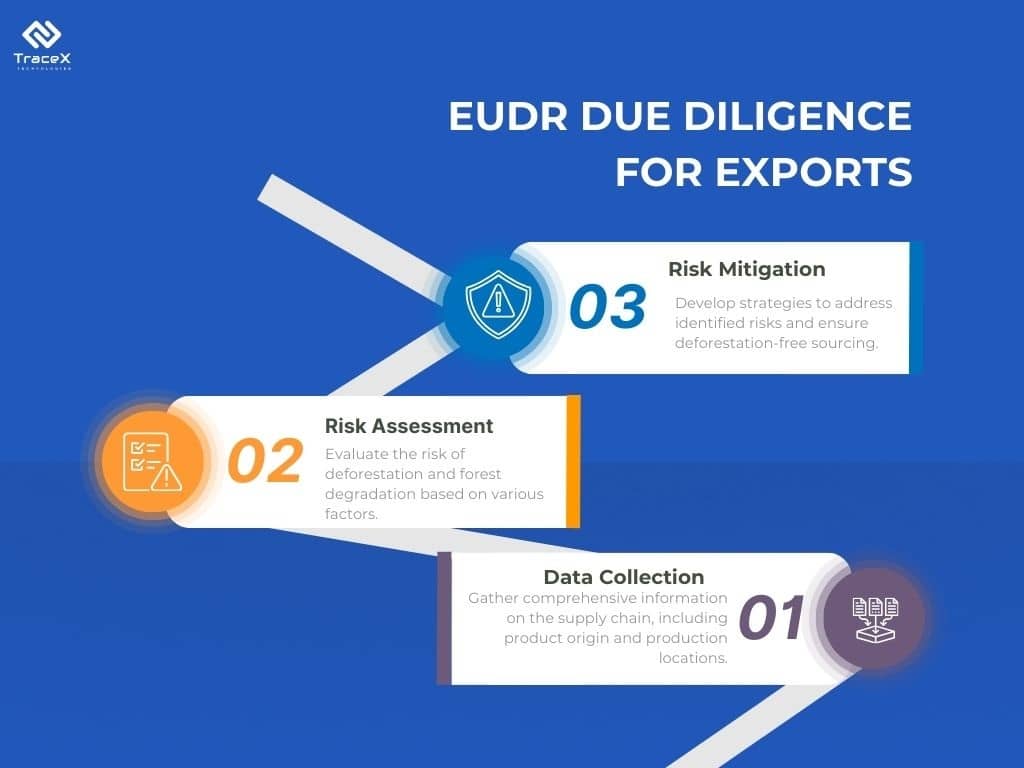Contact: +91 99725 24322 |
Menu
Menu
Quick summary: Explore the key challenges faced by Malaysian exporters in complying with the EU Deforestation Regulation (EUDR). This blog delves into issues like supply chain transparency, documentation complexities, and the risk of smallholder exclusion, offering insights on how to navigate these hurdles and ensure successful compliance.

As the global spotlight increasingly focuses on environmental sustainability, EUDR presents both a significant challenge and an opportunity for Malaysian exporters. The European Union’s Deforestation Regulation (EUDR) is a landmark policy designed to ensure that products sold within the EU are not linked to deforestation or forest degradation
Malaysian exporters preparing for the EU Deforestation Regulation (EUDR) face several challenges. Key issues include the risk of excluding smallholders, limited availability of compliant supplies, and higher costs.
The Malaysian Palm Oil Council (MPOC) is committed to establishing Malaysia as a global leader in sustainable palm oil production. By prioritizing stakeholder engagement and promoting the Malaysian Sustainable Palm Oil (MSPO) certification, MPOC aims to enhance the industry’s reputation and expand market access.
The European Union’s Deforestation Regulation aims to eliminate products associated with deforestation and forest degradation from EU markets. It applies to a range of commodities, including palm oil, cocoa, coffee, and rubber, which are significant exports for Malaysia. The regulation requires exporters to provide detailed evidence that their products do not contribute to deforestation and are compliant with strict sustainability criteria.
To comply with the EUDR, Malaysian exporters must:
Smallholders, who contribute 40% to Malaysia’s palm oil production, often lack the resources to operate independently. This reliance on intermediaries creates a complex supply chain, hindering data collection and traceability efforts
Without a comprehensive traceability system, exporters struggle to provide the necessary documentation to prove that their products are deforestation-free. This lack of transparency can lead to delays, non-compliance, and potential loss of market access. The process of acquiring certifications and managing documentation can be overwhelming, especially for smaller exporters who may lack the resources to handle these requirements effectively. Non-compliance or incomplete documentation can result in penalties or restricted access to the EU market.
Failure to stay updated with regulatory changes can lead to unintentional non-compliance, which can have serious implications for market access and business operations. Exporters may face difficulties in adjusting their practices to align with new requirements. Ensuring compliance across a diverse and often fragmented supply chain can be complex. Lack of standardization and varying practices among suppliers can hinder efforts to achieve sustainability goals. High compliance costs can strain financial resources and impact the competitiveness of Malaysian exporters in the EU market. Balancing compliance with cost management is crucial for sustaining business operations.

Implementing advanced traceability technologies, such as blockchain-based solutions, can enhance visibility across the supply chain. By leveraging these technologies, exporters can track and document each stage of the supply chain, ensuring compliance with EUDR requirements. Investing in digital solutions that streamline documentation and certification processes can help exporters manage these requirements more efficiently. Automated systems for document management and certification tracking can reduce administrative burdens and minimize the risk of errors.
Establishing a dedicated compliance team or partnering with regulatory experts can help exporters stay informed about regulatory changes and ensure timely adaptation. Regular training and updates on regulatory requirements can also help maintain compliance. Promoting and implementing sustainability initiatives within the supply chain can help address this challenge. Collaborating with suppliers to adopt best practices, providing training, and establishing sustainability standards can contribute to achieving overall compliance. Exploring cost-effective solutions, such as shared compliance resources or partnerships with industry organizations, can help mitigate financial pressures. Additionally, leveraging government support and incentives for sustainability initiatives can reduce the financial burden on exporters.
TraceX’s EUDR Compliance Platform offers several solutions to help Malaysian exporters tackle the challenges associated with the EU Deforestation Regulation (EUDR):
The platform provides end-to-end traceability, allowing exporters to track and verify every step of the supply chain. This transparency helps in demonstrating that products are deforestation-free and compliant with EU regulations.
The platform automates the generation and management of necessary documents and certifications, such as phytosanitary certificates and customs declarations. This reduces administrative burdens and ensures accurate and timely compliance.
The platform facilitates smallholder inclusion by providing tools for aggregating and verifying compliance across various suppliers. This helps integrate smallholders into the supply chain and ensures they meet EUDR standards.
The platform offers cost-effective compliance solutions by optimizing traceability processes and reducing the need for manual interventions. This helps lower overall compliance costs and makes it more feasible for exporters to meet EUDR requirements.
TraceX provides up-to-date information and insights on regulatory changes, helping exporters stay informed and adapt their practices accordingly. This proactive approach mitigates the risk of non-compliance due to regulatory uncertainties.
The platform streamlines the preparation of EUDR-compliant shipments by integrating traceability, documentation, and certification into a unified system. This ensures that shipments meet all regulatory requirements and are prepared on time.
Explore our EUDR Compliance Platform
The EU Deforestation Regulation presents both challenges and opportunities for Malaysian exporters. While navigating the complexities of compliance requires effort and investment, it also offers a chance to demonstrate commitment to sustainability and gain a competitive edge in the global market. By addressing the challenges with strategic solutions and embracing best practices, Malaysian exporters can successfully navigate the EUDR landscape and contribute to a more sustainable future.
By focusing on transparency, efficiency, and sustainability, Malaysian exporters can turn the regulatory challenge into a powerful driver of positive change and innovation in the agribusiness sector.
